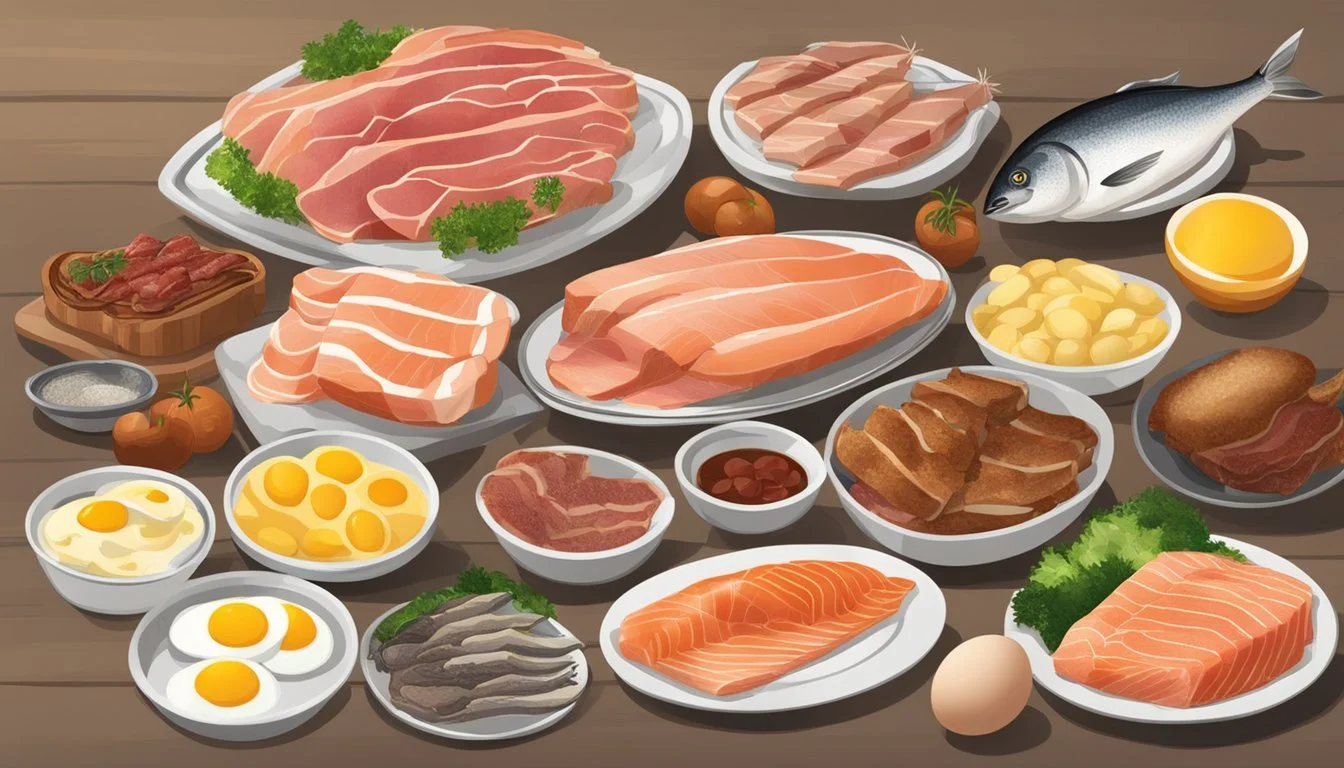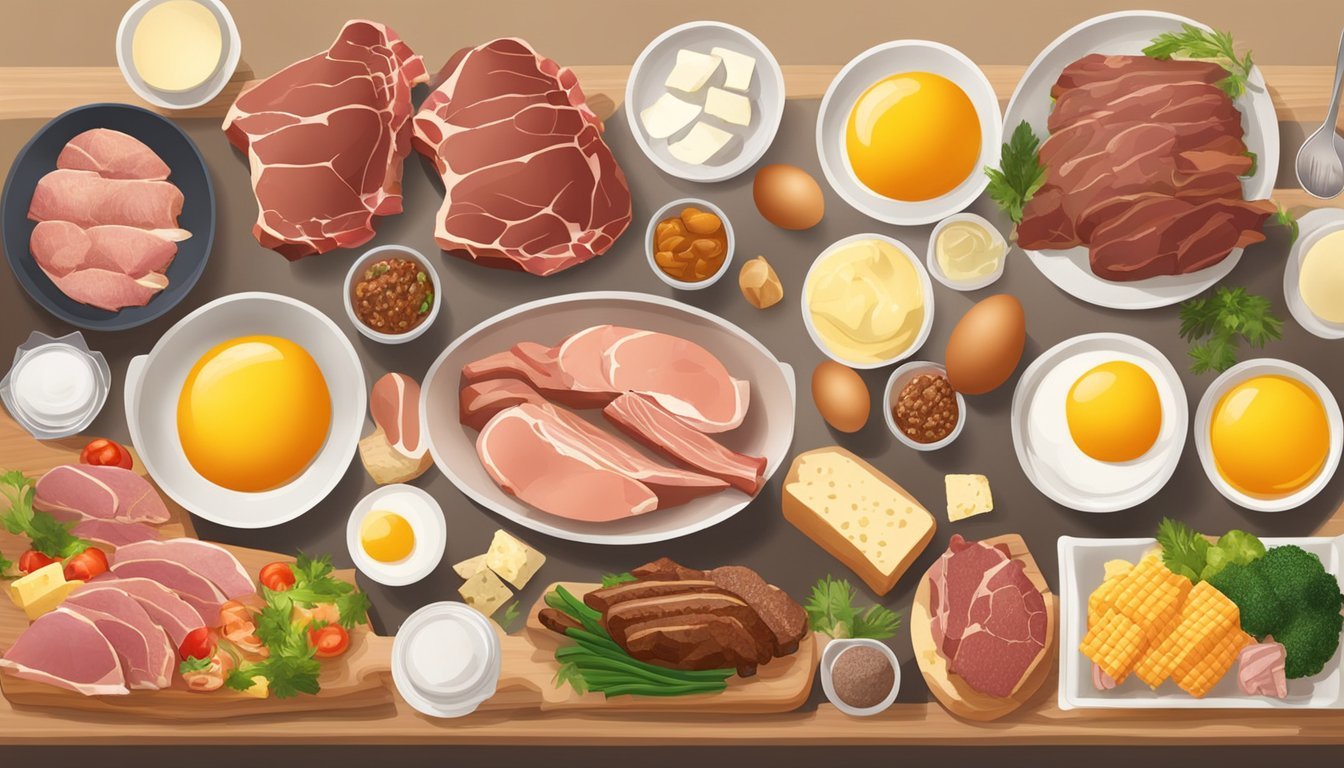10 Carnivore Diet-Friendly Foods to Eat on a Budget
Affordable Options Explained
Adopting a carnivore diet can sometimes seem financially daunting, yet it doesn't have to break the bank. Many individuals successfully navigate this meat-centric lifestyle by choosing affordable yet nutritious options. Identifying budget-friendly carnivore diet foods allows enthusiasts to enjoy the benefits without overspending.
This article aims to highlight ten budget-friendly foods that fit seamlessly into a carnivore diet. By making informed choices, anyone can manage their diet costs effectively while maintaining nutritional balance.
1) Ground Beef
Ground beef is a highly versatile and affordable option for those adhering to a carnivore diet. It can be used in a multitude of recipes, such as meatballs, burgers, and casseroles.
Buying ground beef in bulk can significantly reduce costs. Many stores offer discounts for larger quantities, making it a practical choice for budget-conscious individuals.
The average price of ground beef in the United States is around $4.33 per pound. At this price, consuming 2.5 pounds per day to meet a 2,500-calorie requirement would cost approximately $10.83.
Opting for fattier cuts can provide more calories and nutrients while potentially being cheaper than leaner options. Choices like 80/20 ground beef balance flavor and cost effectively.
Preparing meals ahead of time and freezing portions ensures that ground beef stays fresh and reduces food waste.
2) Chicken Thighs
Chicken thighs are an excellent carnivore diet-friendly food that fits well within a budget. They are often cheaper than chicken breasts and offer a richer, more savory flavor that many people prefer.
Seasoning chicken thighs is a straightforward process. Start by preheating your oven to around 375°F (190°C). Then, season the chicken with salt and pepper. For those looking to enhance the flavor further, spices like paprika, garlic powder, and thyme can be added.
When cooking chicken thighs, using a moderate temperature ensures they remain tender and juicy. Baking them for around 30 minutes, or until the internal temperature reaches 165°F (74°C), is a reliable method. It’s also advisable to let the chicken rest for 10 to 15 minutes after cooking to allow the juices to redistribute.
Chicken thighs are versatile and can be paired with other carnivore-friendly foods, such as pork chops or duck breast. They can be part of a rotating menu to keep meals varied and enjoyable. Their skin also provides extra fat, which aids in staying satiated longer, an important aspect of the carnivore diet.
3) Pork Shoulder
Pork shoulder is a versatile and affordable option for those following the carnivore diet. It is rich in protein and essential nutrients, making it an excellent choice for anyone looking to maximize their nutrition on a budget.
This cut of meat is known for its marbling, which provides both flavor and tenderness. When cooked slowly, pork shoulder becomes exceptionally tender, making it perfect for roasting, braising, or slow cooking.
Pork shoulder can also be used in a variety of dishes, such as pulled pork, carnitas, or even simple oven-roasted meals. Its affordability means you can buy larger quantities and store leftovers for future meals, reducing overall food costs.
Including pork shoulder in a carnivore diet ensures a steady intake of vitamins and minerals like thiamin, niacin, and vitamin B6. These are vital for energy metabolism and overall health.
Many find pork shoulder to be a more budget-friendly alternative compared to other cuts of meat, without compromising on taste or nutritional value. Its adaptability in various recipes means it can easily be incorporated into weekly meal plans.
4) Canned Tuna
Canned tuna is an excellent choice for anyone on a carnivore diet looking to eat on a budget. It is both cost-effective and convenient, making it a practical option for many.
Packed with high-quality protein, canned tuna provides essential nutrients, such as omega-3 fatty acids. These nutrients support heart health and maintain muscle mass, which is crucial for those adhering to a meat-based diet.
Selecting tuna packed in water can be a healthier choice, as it often contains fewer additives. It's important for individuals to check labels for any added sugars or unnecessary ingredients.
Canned tuna is also versatile and can be eaten straight from the can or used in various simple recipes. It can easily be added to salads, mixed with eggs, or paired with other meats for a protein-rich meal.
5) Eggs
Eggs are an excellent staple for those on a carnivore diet, offering high-quality protein at an affordable price. They provide all nine essential amino acids necessary for muscle growth and repair. This makes them a versatile and nutrient-dense option for budget-conscious individuals.
Eggs are rich in vitamins and minerals such as vitamin B12, riboflavin, and selenium. These nutrients support energy production and immune function. The bioavailability of these nutrients in eggs is high, meaning the body can easily absorb and use them effectively.
There are numerous ways to prepare eggs, adding variety to the diet. They can be boiled, scrambled, fried, or made into omelettes. Pairing them with other carnivore-friendly foods like bacon or cheese can enhance taste and nutritional value.
Eggs also contain healthy fats, including omega-3 fatty acids, which are beneficial for heart health. Their inclusion in a carnivore diet can help maintain satiety and support overall health. Whether consumed for breakfast, lunch, or dinner, eggs are a cost-effective, nutrient-packed choice for those following a meat-based diet.
6) Beef Liver
Beef liver is a nutrient-dense option that fits well into a carnivore diet, especially for those on a budget. It's rich in vitamins A, B12, and riboflavin, as well as minerals like iron and copper, contributing significantly to essential nutrient intake.
Cooking beef liver can be approached in various ways. It can be sautéed, seared, or pan-fried. Heating a pan until it’s hot before adding fat, such as butter or lard, ensures a good sear. Adding bacon bits at the end can provide extra flavor and texture.
Those looking to get more creative with beef liver can try making liver jerky. This preserves the liver and makes it a convenient, protein-rich snack. Liver jerky is also an excellent choice for those who might not enjoy the texture of freshly cooked liver.
In terms of cost, beef liver is a very economical choice. It is one of the most affordable cuts of meat, typically ranging from $4 to $8 per pound for grass-fed options. This affordability, combined with its nutritional benefits, makes it a staple in budget-friendly carnivore diets.
7) Sardines
Sardines are an excellent choice for those on a carnivore diet, particularly because they are cost-effective and packed with nutrients. Available in canned form, they offer a convenient and shelf-stable option for quick meals or snacks.
These small fish are rich in essential nutrients such as omega-3 fatty acids, protein, and vitamins like B12 and D. They also provide calcium, thanks to their edible bones, which can be beneficial for bone health.
Including sardines in the diet can also help meet daily magnesium requirements, making them a well-rounded addition. Their versatility allows them to be consumed straight from the can or used as a topping for various dishes like salads.
Sardines can be found in most grocery stores and are often sold in bulk for even greater savings. Their affordability and nutritional profile make sardines a practical and beneficial choice for anyone committed to a carnivore diet.
8) Pork Belly
Pork belly is a fantastic option for those following a carnivore diet on a budget. It's both affordable and nutrient-dense. This cut of meat is known for its rich flavor, which comes from its high-fat content.
Cooking pork belly can be straightforward. Begin by preheating an oven to 450°F (230°C) and roasting it for about 30 minutes. Then, reduce the heat to 275°F (135°C) and continue roasting until the meat is tender.
Pork belly provides essential vitamins and minerals such as niacin, vitamin B6, and magnesium. These nutrients are crucial for maintaining energy levels and overall health.
Incorporating pork belly into your diet ensures a delicious and nutritious meal option. It can be paired with other high-fat, animal-based foods to create a balanced carnivore meal plan.
9) Cheese
Cheese can be a valuable addition to a budget-friendly carnivore diet. While not all cheeses are permitted, selecting the right types can keep meals varied and enjoyable.
Hard cheeses like cheddar and gouda are great options for the carnivore diet. These cheeses are rich in fats and protein, making them satisfying and energy-dense.
Soft cheeses such as cream cheese also fit well within the diet. These cheeses can be used as a spread or ingredient in other dishes, adding a creamy texture without breaking the bank.
Opt for purchasing cheese in larger quantities to reduce costs. Bulk buying often leads to per-unit savings, allowing one to have high-quality cheese while sticking to a budget. Portion and freeze if necessary to extend shelf life.
10) Greek Yogurt
Greek yogurt can be a nutritious and affordable addition to the carnivore diet, provided it fits within individual dietary preferences and tolerances. It offers a rich source of protein, which can be especially beneficial for muscle maintenance and growth.
This yogurt type also contains probiotics that support gut health. Some carnivores may find these beneficial for digestion.
When incorporating Greek yogurt, it's important to choose full-fat, unflavored options. This ensures it aligns better with the diet’s high-fat, low-carb approach.
Individuals with dairy sensitivities should be cautious. In such cases, it may be best to avoid all forms of dairy, including Greek yogurt, to prevent adverse reactions.
Understanding the Carnivore Diet
The carnivore diet focuses exclusively on animal products, eschewing all plant-based foods. By centering meals around meat, eggs, and certain dairy items, it aims to provide essential nutrients and promote various health benefits.
What is the Carnivore Diet?
The carnivore diet consists solely of animal-derived foods. This includes different cuts of meat, such as beef, pork, and poultry. Seafood like salmon and shrimp can also be part of the diet. Additionally, eggs and certain dairy products, such as cheese and butter, are included.
The diet excludes all fruits, vegetables, grains, nuts, and seeds. Proponents argue that this approach simplifies eating patterns and aligns with what they believe to be optimal human nutrition.
Benefits of the Carnivore Diet
Advocates suggest that the carnivore diet may enhance joint health, immune function, and heart health. By focusing on fatty meats and high-quality proteins, the diet may promote sustained energy levels and better skin vitality.
Some individuals report improved digestive well-being due to the exclusion of plant-based foods, which they believe can cause inflammation and digestive issues. This diet is also noted for its simplicity, potentially making meal planning and preparation more straightforward.
Challenges and Considerations
Adopting the carnivore diet can present several challenges. One primary concern is the potential for nutrient deficiencies, as the diet eliminates all plant-based sources of vitamins and minerals. It's crucial to ensure a variety of animal products to cover nutritional needs.
Another challenge is the social aspect, as this diet can be restrictive and difficult to follow in social situations or when dining out. Additionally, there may be initial side effects such as digestive adjustments and keto flu-like symptoms.
Long-term adherence could also be difficult for some due to cravings for carbohydrates and other non-animal foods. It's essential to approach the diet with awareness and potentially seek guidance from healthcare professionals to maintain a balanced nutrient intake.
Budget-Friendly Meal Planning
Effective budget-friendly meal planning for the carnivore diet involves strategic shopping, efficient meal prep, and creatively using leftovers to maximize cost-efficiency. These tactics help stretch your food budget while adhering to the diet.
How to Shop for Carnivore Diet Foods on a Budget
Shopping smart begins with identifying cost-effective cuts of meat. Ruminant meats like beef, lamb, and bison are nutritious and available across various price points. Opt for cheaper cuts such as chuck roast, brisket, and top round, which are often more affordable than premium steaks.
Buying in bulk can significantly reduce costs. Purchasing large quantities, perhaps from local farms or family butchers, offers better deals per pound. Consider joining meat subscription services that deliver bulk cuts to save money. Local deals and discounts can also be highly beneficial.
Meal Prep and Planning Tips
Effective meal prepping saves time and money. Begin by drafting a weekly plan featuring budget-friendly carnivore meals. Use sturdy proteins like ground beef, pork shoulder, and chicken thighs to create multiple dishes.
Batch cooking is a time-saver. Prepare large quantities of staples such as roast meats, bone broth, and meatballs which can be portioned out for the week. This approach reduces the need for midweek cooking and minimizes food waste.
Storing pre-cooked meals properly ensures they remain fresh and safe to eat. Utilize airtight containers and freezer bags to extend the shelf life of your meals. Labeling each container with the meal and date prepared aids in organization and consumption efficiency.
Making the Most of Leftovers
Leftovers can become a cornerstone of budget-friendly eating. Transforming leftover meats into new meals can prevent fatigue from repetitive dishes. For instance, roast chicken can be shredded for salads or soups, and extra steak can be chopped for next-day stir-fries or omelets.
Saving bones and carcasses from your meat can provide the base for a nutritious bone broth. This broth can enhance the flavor of soups, stews, or be enjoyed as a standalone beverage. Additionally, the broth is packed with minerals and nutrients, making it a budget-friendly, healthy addition.
Utilize all parts of the meat to get the most value. Even fats trimmed from cuts of meat can be rendered down into tallow for cooking, adding another layer of cost-efficiency to your carnivore diet meal plans.
By following these strategies, adhering to a carnivore diet on a budget becomes both achievable and sustainable.
Maximizing Nutritional Value
When following a carnivore diet on a budget, it is crucial to ensure that the meals are not only affordable but also packed with the essential nutrients needed for optimal health. Focus on nutrient-dense foods, consider supplements when necessary, and be aware of potential nutritional deficiencies.
Choosing Nutrient-Dense Foods
Selecting nutrient-dense options can ensure that each meal contributes positively to overall health. Ruminant meat, such as beef, lamb, and bison, is rich in essential nutrients like iron, zinc, and B vitamins.
Opt for cheaper cuts like chuck roast and top round, which offer the same nutritional benefits as more expensive cuts. Organ meats are particularly nutrient-dense and often more affordable. For example, liver is a powerhouse of vitamins A, B12, and iron.
Supplements and Additional Nutrients
Even with the best budget planning, some nutrients might be insufficient in a strict carnivore diet. Common supplements include electrolytes, particularly magnesium, potassium, and sodium, essential for avoiding deficiencies.
Fish oil or omega-3 supplements can be beneficial to balance the higher omega-6 intake from meat. Vitamin D supplements may also be necessary, especially in areas with limited sunlight exposure. Adding bone broth to your diet can provide minerals and collagen, supporting joint and gut health.
Common Nutritional Deficiencies and Solutions
A carnivore diet can lead to specific deficiencies if not carefully managed. Vitamin C deficiency is a risk since this nutrient is primarily found in plant foods. Organ meats, particularly liver, and certain fish like salmon roe provide some vitamin C.
Magnesium deficiency can be addressed through supplements or foods like bone marrow. Fiber is absent in a carnivore diet, which may affect gut health. While not strictly carnivore, some may include small amounts of psyllium husk or other non-digestible fiber sources. Recognizing and addressing these deficiencies can ensure a balanced and healthy diet.










